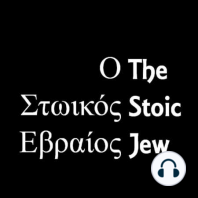3 min listen
Aurelius - Meditations Book I: A Stoic Emperor's Thanksgiving
FromThe Stoic Jew
ratings:
Length:
11 minutes
Released:
Nov 26, 2020
Format:
Podcast episode
Description
Epictetus – Enchiridion 1On the one hand, there are things that are in our power, whereas other things are not in our power. In our power are opinion, impulse, desire, aversion and, in a word, whatever is our own doing. Things not in our power include our body, our possessions, our reputations, our status, and, in a word, whatever is not our own doing. ---------------------------------------------------------------------------Ran - Drashah #10[Moshe Rabbeinu] warned Yisrael about two things: (1) that they should not ascribe their success to their own ability and to the might of their hand, and (2) that they should not ascribe their conquest of the land to their own merit. He began by saying: “Lest you eat and be satisfied, and you build good houses and settle, and your cattle and sheep and goats increase … And you will say in your heart, ‘My ability and the might of my own hand made me all this wealth!’ Then you shall remember Hashem, your God: that it is He Who gives you the ability to make wealth.” The meaning of this is as follows: The truth is that people have different talents in different areas. For example, certain people are predisposed to receive wisdom, whereas others are predisposed to devise strategies to gather and amass [wealth]. On account of this, the wealthy man can truthfully say, from a certain angle, “My ability and the might of my hand made me this wealth.” Nevertheless, insofar as that ability was implanted within you, be sure to remember Who gives you the ability to make wealth.Moshe did not say, “Then you shall remember that Hashem is the One Who gives you wealth,” for if he had said that, he would be minimizing [the fact] that the ability implanted within the person is an intermediate cause in the accumulation of that wealth – but this is not the case. Therefore he said: “Although your ability is what made you this wealth, you should remember Who gives you that ability (blessed is He).”For an elaboration on these ideas, see my article Parashas Eikev: On Attributing Our Success to Hashem.---------------------------------------------------------------------------If you have questions, comments, or feedback, I would love to hear! Please feel free to contact me at rabbischneeweiss at gmail.----------Stoic texts:The Meditations of Marcus AureliusLetters from a Stoic Master (Seneca)The Discourses of EpictetusThe Enchiridion (Handbook) of Epictetus----------Patreon: https://www.patreon.com/rabbischneeweissYouTube Channel: https://www.youtube.com/user/rabbischneeweissBlog: https://kolhaseridim.blogspot.com/Twitter: https://twitter.com/rmschneeweiss"The Mishlei Podcast": https://mishlei.buzzsprout.com"The Stoic Jew" Podcast: https://thestoicjew.buzzsprout.com"Rambam Bekius" Podcast: https://rambambekius.buzzsprout.com"Machshavah Lab" Podcast: https://machshavahlab.buzzsprout.com"The Tefilah PodcasSupport the show
Released:
Nov 26, 2020
Format:
Podcast episode
Titles in the series (100)
Intro - How NOT to Listen to This Podcast by The Stoic Jew
